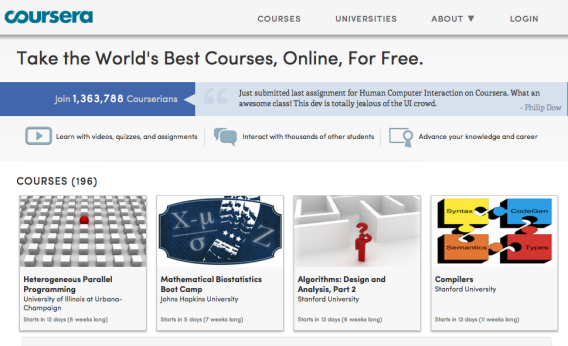As someone who loved school and reveled in a liberal arts education, I was overjoyed to discover Coursera. It is a website that offers online college courses on a slew of topics, all taught by professors from excellent academic institutions across the globe. And the best part is that it's completely free.
If you've ever enjoyed learning just for the sake of learning, or have always yearned to study a particular topic in-depth, chances are you will find something you love on Coursera. The variety of available courses ensures that everyone can find some appealing subject or learn some useful skill. I just completed my first course, a 10-week survey of Greek & Roman Mythology taught by a professor at the University of Pennsylvania, and it was a magnificent experience. I had taken a mythology course in college, but as far as I'm concerned, you can never get enough of the classics. This week, I embarked upon two new classes offered by Duke University, one on the philosophy of reason and argument, and another on introductory astronomy. These are subjects I always wanted to take but didn't have time for in college. Thanks to Coursera, I can now spend a few hours every week learning about how to calculate celestial movements or how to analyze an effective argument. If the above subjects seem too esoteric to you, there are plenty of more "practical" courses, like this upcoming one on personal financial planning, that most people would surely benefit from.
Most of these courses don't require any background knowledge at all and just ask for enthusiastic participants who are eager to learn something new. The coursework involves watching lectures, and may include quizzes, problem sets, or essays. The beauty of Coursera is that in these days of escalating higher educations costs, people can now experience world-class education for free and genuinely learn amazing things that broaden their horizons. A small business owner could take an introductory economics class in the comfort of their own home and learn how to run a more efficient business. Or you could take a literature class and finally read some of those classics that were just too difficult to get through on your own.
Currently you can't get college credit for any of these courses, though some courses offer a certificate of completion if you obtain a certain grade. However, beginning in 2013, Coursera will offer some classes that grant college credit upon completion. These courses won't be free (though I'm sure they won't be prohibitively expensive) and the credit won't be valid at all academic insitutions. Ironically, the Ivy League institutions that offer so many of these classes are most likely to not accept college credit obtained on Coursera. It will be interesting to see how things change and develop over time. No one can deny the quality of the lectures that are currently available and people are just going to be clamoring for more.
So go forth to Coursera. There's a whole universe of knowledge to explore.
If you've ever enjoyed learning just for the sake of learning, or have always yearned to study a particular topic in-depth, chances are you will find something you love on Coursera. The variety of available courses ensures that everyone can find some appealing subject or learn some useful skill. I just completed my first course, a 10-week survey of Greek & Roman Mythology taught by a professor at the University of Pennsylvania, and it was a magnificent experience. I had taken a mythology course in college, but as far as I'm concerned, you can never get enough of the classics. This week, I embarked upon two new classes offered by Duke University, one on the philosophy of reason and argument, and another on introductory astronomy. These are subjects I always wanted to take but didn't have time for in college. Thanks to Coursera, I can now spend a few hours every week learning about how to calculate celestial movements or how to analyze an effective argument. If the above subjects seem too esoteric to you, there are plenty of more "practical" courses, like this upcoming one on personal financial planning, that most people would surely benefit from.
Most of these courses don't require any background knowledge at all and just ask for enthusiastic participants who are eager to learn something new. The coursework involves watching lectures, and may include quizzes, problem sets, or essays. The beauty of Coursera is that in these days of escalating higher educations costs, people can now experience world-class education for free and genuinely learn amazing things that broaden their horizons. A small business owner could take an introductory economics class in the comfort of their own home and learn how to run a more efficient business. Or you could take a literature class and finally read some of those classics that were just too difficult to get through on your own.
Currently you can't get college credit for any of these courses, though some courses offer a certificate of completion if you obtain a certain grade. However, beginning in 2013, Coursera will offer some classes that grant college credit upon completion. These courses won't be free (though I'm sure they won't be prohibitively expensive) and the credit won't be valid at all academic insitutions. Ironically, the Ivy League institutions that offer so many of these classes are most likely to not accept college credit obtained on Coursera. It will be interesting to see how things change and develop over time. No one can deny the quality of the lectures that are currently available and people are just going to be clamoring for more.
So go forth to Coursera. There's a whole universe of knowledge to explore.

No comments:
Post a Comment